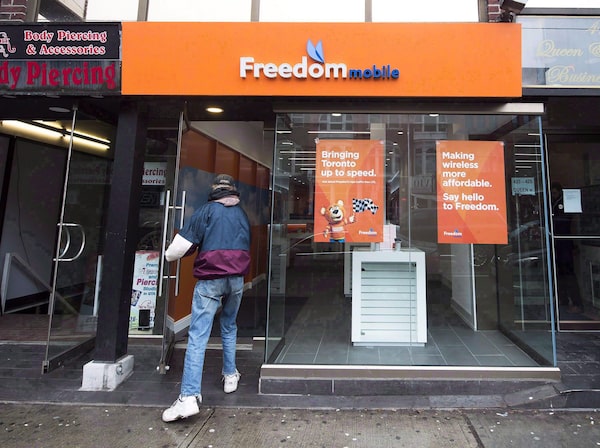
A man enters the store at the new rebranded signage of Freedom Mobile, in Toronto on Nov. 24.Nathan Denette/The Canadian Press
We’ve seen it all before.
A scrappy small fry pledges to take on the Big Three wireless carriers and save us from the oligopoly. But – spoiler alert! – history teaches us how this latest sequel to the wireless wars will end.
Need a recap? Armed with some spectrum and a whole lot of swagger, startups – including Microcell Solutions, Clearnet, Public Mobile and Mobilicity – gave it a go before being gobbled up by major carriers over the years.
Even Wind Mobile, which was initially bankrolled by a foreign telecom giant, couldn’t tough it out as a stand-alone carrier. It continued to function as a wireless-only player in 2014, when it was sold to a consortium of investors that included Globalive Capital, a Toronto investment firm controlled by the discount carrier’s then-chairman and chief executive, Anthony Lacavera.
Two years later, Wind changed hands again and became part of a larger company: regional cable and internet provider Shaw Communications Inc., which eventually renamed it Freedom Mobile.
Cell phone competition won’t improve unless Freedom Mobile is sold to the right buyer
Nowadays, Shaw is weary of wireless warfare. Just like the wireless startups of yesteryear, it wants to sell itself to a larger player. But Ottawa won’t give its blessing for Shaw to tie the knot with Rogers Communications Inc. without divesting some wireless holdings, which is why Freedom Mobile is up for sale yet again.
But the déjà vu doesn’t end there. Mr. Lacavera wants to buy it back.
Globalive Capital has made a $3.75-billion bid to purchase Freedom Mobile, backed by – hold on to your hats – a group of investors. The consortium is led by U.S.-based firms Twin Point Capital and Baupost Group.
Mr. Lacavera, though, isn’t the only blast from the past. Twin Point’s founder, Lawrence Guffey, is already familiar with Canada’s fourth-largest wireless carrier. Mr. Guffey, of course, is a former director of T-Mobile US and was part of the original investor consortium that purchased Wind Mobile nearly eight years ago and then made a killing by flipping it to Shaw.
Wash. Rinse. Repeat.
Much like Hollywood, the telecom industry is rebooting old ideas. And that’s why Globalive’s proposed do-over won’t deliver us from the clutches of the Big Three this time around, either.
Everyone wants to root for an underdog, including me. Over the years, I’ve been a customer of startups, including Clearnet, Microcell and Wind Mobile. But let’s be realistic, shall we?
Selling Freedom Mobile to an independent buyer (or a consortium of buyers) and positioning it as a stand-alone wireless operator in the 5G era simply won’t result in sustainable market competition.
This is true whether we are talking about Globalive or any other company that can’t offer multi-service telecom bundles (with wireless, internet, TV and home phone) across Freedom Mobile’s operating footprint.
In fact, I’ve made the same argument about Quebecor Inc., which has also made no secret of its interest in acquiring Freedom Mobile, even if it has yet to participate in takeover talks.
Though Quebecor spent big in a government auction of 5G airwaves last year, and has indicated that it has national aspirations, it would face similar challenges as a wireless-only player outside of Quebec, its home market, where it provides multi-service bundles.
Consumers are addicted to the discounts that come with bundles. That’s why, a decade ago, Mr. Lacavera floated the idea of offering multi-service packages at Wind.
Sure, Bell and Telus are successful wireless carriers outside their respective territories, but they benefit from a significant cost structure advantage because of their national network-sharing agreement. Neither Globalive nor Quebecor would have that benefit.
While it’s true that a commercial agreement for network sharing could always be negotiated, incumbents can’t be forced into making such deals. Unless one is struck, Freedom Mobile won’t survive as a wireless-only player over the long term.
“Even if [Quebecor] gets involved, Freedom is still a stand-alone wireless operator, and without any long-term network partnership, we believe it will be a challenge to generate sufficient return on capital. To increase return, we think Freedom will have to raise prices or cut costs dramatically,” Jeff Fan, a telecom analyst with Scotia Capital Inc., wrote in a research note.
In short, Mr. Fan argues that Freedom Mobile’s network must be competitive with those of national carriers in order to succeed.
“The only other alternative for Freedom would be to exit. However, by then, the long list of buyers would have been exhausted and the national operators would be the only ones left,” he added.
For his part, Mr. Lacavera suggested last December that Rogers might be open to signing a network sharing deal with Freedom Mobile’s buyer.
Call me jaded, but I’ll believe it when I see it. Same goes for Mr. Lacavera’s proposal for Freedom Mobile to offer “dynamic pricing” that varies based on a customer’s data consumption habits.
Such talk is reminiscent of Microcell’s promise to revolutionize the market with its City Fido plan. Until, of course, Microcell was swallowed up by Rogers.
Both Globalive and Quebecor deserve credit for getting wireless new entrants off the ground, and for giving the Big Three a run for their money during the talk-and-text era. But those days are long over.
So, unless Ottawa comes up with a new storyline for sustainable competition in the wireless market, Canadians already know how this latest cellular clash is going to end.
Your time is valuable. Have the Top Business Headlines newsletter conveniently delivered to your inbox in the morning or evening. Sign up today.